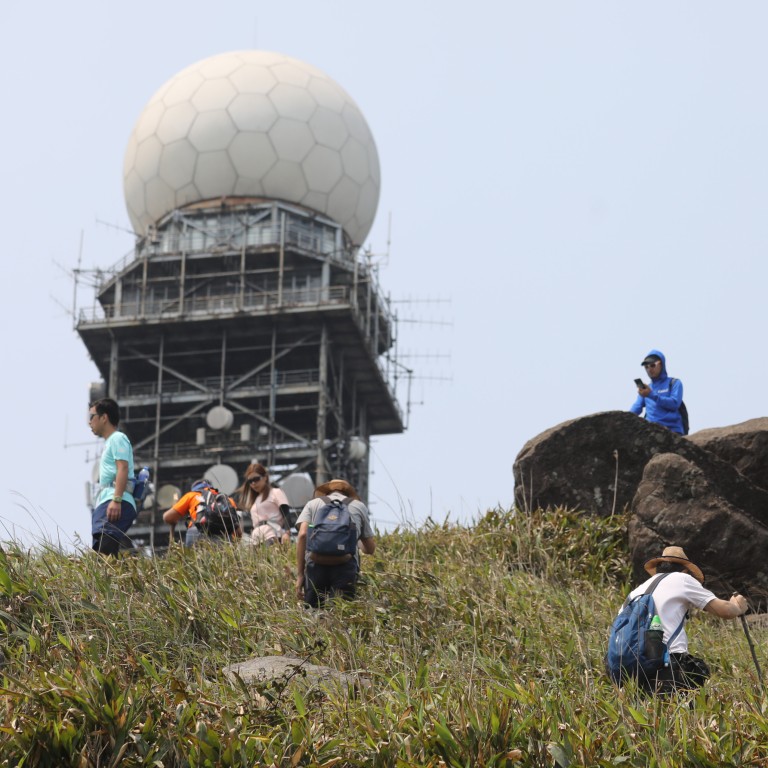
Hong Kong field assistant dies in hospital after insect bite, hand injury
Conservation department worker Lam Kin-wai, 46, was collecting plant specimens in country park when colleagues found him kneeling on ground
A senior field assistant with the conservation department died on Wednesday after he was reportedly bitten by an insect and injured one of his hands while collecting plant specimens in a Hong Kong country park before he passed out.
While the Post learned Lam Kin-wai, 46, also showed signs of heatstroke, the Agriculture, Fisheries and Conservation Department (AFCD) said the cause of death of the senior field assistant would be investigated. It did not reveal what plant specimens he was collecting at Tai Mo Shan Country Park in Tai Po at the time.
“Lam’s right palm was injured when collecting plant specimens at Tai Mo Shan Country Park with his colleagues [on Wednesday] morning,” the department said. “He quickly lost consciousness.”
Lam was airlifted to Pamela Youde Nethersole Eastern Hospital in Chai Wan, where he was pronounced dead shortly after 2pm.
According to the department, Lam was mainly charged with collecting plant specimens and identifying species.
The Post learned Lam told his colleagues that he suspected he had been bitten by an insect. A source familiar with the case said Lam and his two colleagues started their journey at about 8am and began collecting samples on a slope.
“At around 11am, his colleagues found him kneeling on the ground and breathing rapidly and then one of them made a report to police,” the insider said, adding police were told Lam showed signs of heatstroke at the time.
The incident occurred when the temperature in Tai Po rose to 34 degrees Celsius (93 Fahrenheit), with the Observatory issuing a “very hot weather warning”.
The source said an autopsy was likely to be carried out to ascertain the cause of the death.
The department said it had created safety guidelines for outdoor work and regularly shared them with all staff members. The department also provided training on occupational health and safety hazards for outdoor work and supplied protective equipment and mosquito repellent to employees, it said.

Expressing sadness over Lam’s death and offering condolence to his family, AFCD director Mickey Lai Kin-ming said: “Having been with the AFCD for over 13 years, Mr Lam served the community with dedication and perseverance. His performance was excellent and he was held in high regard by colleagues. I am deeply grieved at the loss of such a devoted colleague.”
Secretary for Environment and Ecology Tse Chin-wan also expressed sadness over Lam’s death and pledged to provide the necessary support to his family.
General practitioner Lam Wing-wo said the fatality rate of heatstroke depended on various factors, including whether the individual promptly addressed the issues or received assistance.
He noted that outdoor workers experienced internal heat build-up compounded by exposure to sunlight, making them more susceptible to heat exhaustion, which could progress to heatstroke.
Lam advised them to stay hydrated, take regular breaks in the shade when possible and watch for signs of heat exhaustion such as heavy sweating, dizziness, nausea and bumps on their skin.
He recommended that anyone attending to the victim move them to a sheltered area and promptly seek medical assistance.
Regarding allergic reactions from plant contact, Lam said local plants like hydrangeas and the Sensitive Plant were common poisonous flora in Hong Kong. Symptoms included redness, swelling, itchiness, hives and potential throat swelling, which could obstruct the airway and be fatal, he said.
Anson Cheng, founder of the Hong Kong Guardians volunteer rescue group, said insects of the Vespa genus and centipedes were the types most likely to trigger allergic reactions and urged hikers to steer clear of them.
Cheng emphasised that anyone who had been stung should try to identify the type of bug involved so that medical personnel could administer the most suitable antivenom.
In May last year, Ng Kwok-pui, a 64-year-old field assistant at the same department died after being stung four times by bees while planting trees in the Lantau South Country Park.
Ng was among five workers from the department planting trees along the Chi Ma Wan Country Trail near Mong Tung Wan at the time of the incident.
He was one of two workers attacked by bees in two separate cases within a span of four hours on the same day.
The other worker, a 33-year-old man, passed out after he was stung on the back of his left hand while carrying out slope repair work in Sha Tin. He regained consciousness before emergency personnel arrived at the scene and was taken to Prince of Wales Hospital for treatment.


